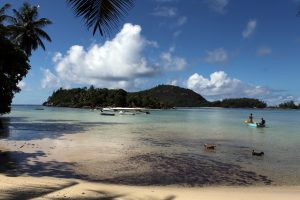Indian Foreign Minister S. Jaishankar’s visit to the Seychelles last week, during which he described the island nation as “central” to India’s Security and Growth for All in the Region (SAGAR) vision, highlights New Delhi’s renewed efforts at intensifying bilateral ties between the two countries. The Seychelles held presidential elections last month. Along with taking the opportunity to congratulate the Indian-origin President Wavel Ramkalawan on his landslide victory against the incumbent President Danny Faure, New Delhi has sought to boost its engagement with the Seychelles, as it looks towards deeper cooperation on economic issues, tourism, counterterrorism, and maritime security. The Indian foreign minister also met the Seychelles’ Tourism Minister Sylvestre Radegonde in order to boost tourism to a nation that competes with the Maldives to attract Indian tourists.
India has maintained diplomatic ties with the Seychelles since the Western Indian Ocean Island state’s independence in 1976, and has played a key role in supporting its naval capabilities. New Delhi offered the nation patrol ships in 2005 and 2014, maritime surveillance aircrafts twice in 2013 and 2018, and an interceptor boat for patrolling its exclusive economic zones in 2016. During his previous visit to the Seychelles in 2015, Prime Minister Narendra Modi secured a pact with then President Faure to jointly develop a naval base on Assumption Island, which lies to the north of Madagascar. This was a key project of SAGAR, seen by some as India’s strategic counter to the Chinese military base in Djibouti. In lieu of a 2015 pact amid the rising opposition to the Assumption Island base, in 2018 India had signed a two-decade long agreement to develop an airstrip and naval jetty, alongside provision of a $100 million credit line for the upgrading of the island nation’s defense. However, the deal was called off when the then opposition leader Wavel Ramkalawan raised sovereignty issues and garnered public support against corruption in the Seychelles government and New Delhi’s involvement in the defense sphere.
Consequently, Faure’s administration had been losing popularity and India was unable to revive the Assumption Island project despite changing its terms to suit the opposition’s sovereignty protection demands. However, with the opposition winning the elections, India’s approach has been to enhance people-to-people ties and assure its commitment to democratic values and rule of law in the Seychelles. The foreign minister’s visit was preceded by the India and Seychelles business forum earlier this year, which aimed at increased investment and trade from India and enhanced tourism. The island nation saw an increased flow of Chinese tourists before the pandemic. Besides this, under the SAGAR Mission, India has also prioritized the distribution of COVID-19-related medical supplies to the Seychelles, alongside Sri Lanka, Maldives and Mauritius, in competition with China.
The Seychelles, a nation comprising over a hundred small islands, is crucial for India’s Neighborhood First policy, and is also a hotspot for Sino-Indian competition over Indian Ocean infrastructure projects. China has engaged in boosting trade and has undertaken several infrastructure projects in the nation, including the construction of its parliament building. Jaishankar’s visit secured Indian infrastructure projects worth $91 million for the Seychelles, which will include the construction of a new government house, police headquarters, and office of the attorney general. Though the two sides did not discuss building a naval base on Assumption Island, India agreed to deepen security ties in the post-COVID era. In the past, the Seychelles has received training from India for the Seychelles People’s Defense Force. Jaishankar’s visit also saw discussions on non-traditional security threats such as illicit fishing and drug trafficking – a key problem for a nation where the rate of drug use among youth is one of the highest in Africa.
New Delhi’s Victoria outreach happened simultaneously as Indian National Security Advisor Ajit Doval held a security trilateral with the Maldives and Sri Lanka in Colombo to boost defense ties as well as economic collaboration in the Indian Ocean region. India’s economic and security outreach, and the leveling out of its relations with island nations in its neighborhood, is also aimed at rebuilding supply chains that have been ruptured by the pandemic. India is seeking to recalibrate the global supply chain system through alternatives to the Beijing-led Belt and Road Initiative. The Seychelles’ importance is high for India as New Delhi strives to tackle piracy in the Western Indian Ocean as well as battle terrorist threats from the sea. Seychelles also forms a crucial part of India’s overall Africa outreach and in its Indo-Pacific vision of free, open, and rules-based maritime order.
Looking ahead, India should tread its path carefully, by first securing economic ties with the country, as a way to ameliorate sovereignty concerns. The Seychelles’ centrality in India’s SAGAR vision cannot materialize without an Indian commitment to address the island country’s pressing (non-traditional) security threats. Indian policymakers also need to address issues that hamper bilateral trade with the Indian Ocean nation, such as the lack of profitable shipping routes between the two countries, and boost direct trade with the Seychelles by cutting out the middlemen who typically facilitate imports to the Seychelles from India and other nations in the region. Despite being in India’s “neighborhood,” a lack of direct flights between New Delhi and Victoria has established the Maldives as a preferred destination for Indian tourists, owing to the easier connectivity. India could also capitalize on the tourism industry in the Seychelles by establishing India-owned and managed tourist businesses which are so far completely absent.
India’s economic development in the post-pandemic era is symbiotically linked to neighbors like the Seychelles. The island nation is also key to India’s deeper engagement in Africa, as well as in India’s security and economic strategy in the Indian Ocean.
Astha Chadha is a Ph.D. student at Graduate School of Asia Pacific Studies, Ritsumeikan Asia Pacific University, Japan.

































